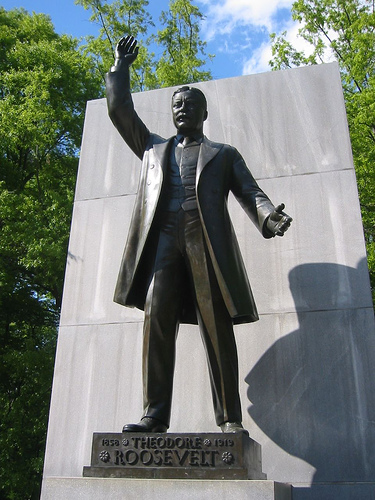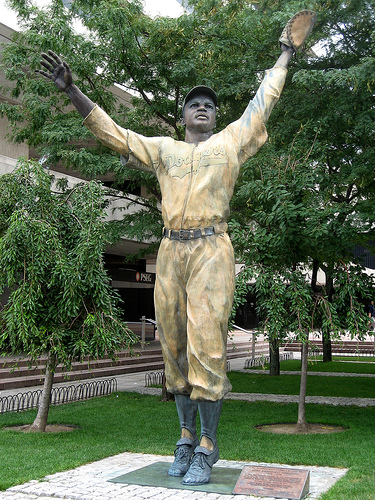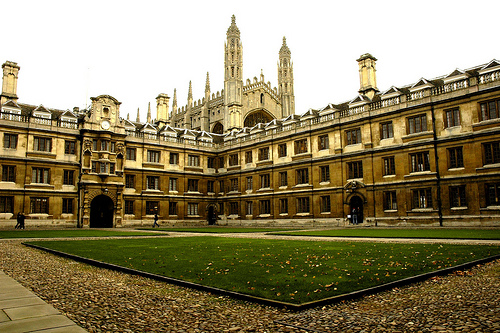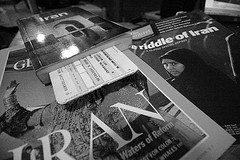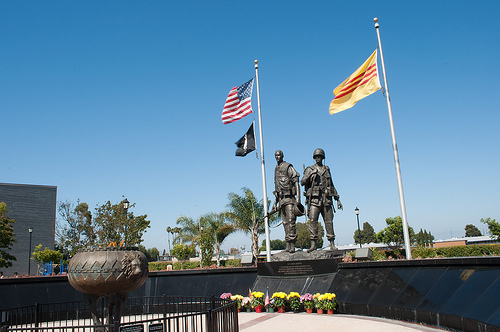Theodore was our twenty-sixth president of the United States during the period from September 14, 1901 to March 3, 1909. Theodore had a quite interesting and full life. During the course of this paper I intend to further explore his early life, political path, things most remembered about him, and his pursuits beyond his presidential career. After I provide this information I am sure you will understand, as did I, why Theodore Roosevelt has been referred to as the fourth greatest American President which earned him an image etched in stone on Mt. Rushmore next to the other three historically considered greatest American Presidents.
Continue reading…
Posts tagged with 'college'
Jackie Robinson: A Man Beyond Baseball
Research and writings dedicated to the life of Jackie Robinson have generally focused on his achievements in the realm of baseball. In most of these works, Robinson’s success in breaking the color barrier in Major League Baseball is exposed to heighten his contribution to humanity beyond that of a mere athlete. This is not an adequate approach to the study of Robinson’s humanitarian achievements. The focus of this research paper includes and extends beyond baseball to include other aspects of Robinson’s contribution to humanity. It will be shown that Robinson learned at a young age to face adverse situations and fight to create a positive result; a tool he would use throughout his life. Through the utilization of this tool he would be groomed to become the man to break the color barrier in Major-League Baseball. During this period and beyond Robinson’s passion for helping people will be exposed to show his contribution to humanity in the areas of politics, business, civil rights, and charity. The combination of all of these achievements will show that a deeper contribution to humanity was made by Robinson. A contribution beyond that of just baseball which would lead to a legacy that continues to make an impact today.
Continue reading…
How To Apply To College
Have a plan before you start the ball rolling. What will be you educational path? At most colleges you can remain an undeclared major while you complete your core courses (e.g. Math, English, Science, etc.). However, you need to take full responsibility in shaping your educational path.
Every class you take needs to get you one step closer to your degree. Decide what you want to do for a career, and then decide what degree will help you be the most successful in that career.
Continue reading…
U.S. National Security Policy Towards Iran
United States (U.S.) national security policy towards Iran is a complicated policy that has drastically changed throughout history. In providing the history of U.S. and Iranian relations the complex nature of involvement will become apparent. Once a history has been provided, there must be an analysis of the current U.S. interest in Iran. What factors warrant a U.S. strategy towards Iran? Are there economic or political interest? After the current U.S. interests are exposed an explanation of current U.S. policy must be provided. Is U.S. policy entrenched in creating difficulties for the Iranian government or is there more of an open diplomatic dialogue? In examining the U.S. national security policy towards Iran there must be the inclusion of what problems within Iran can have an impact on the U.S. Are there environmental concerns? Once all of these points-of-interest are discussed it will be shown that U.S. national security policy towards Iran is aimed at reducing the damage of a tyrannical government and increasing benefit and safety to the U.S.
Continue reading…
The Things They Carried
Tim O’Brien wrote a series of gripping individual stories that were combined to create one book: The Things They Carried. This book recreated the emotion of a Vietnam War draftee before, during, and after the war. In a closer analysis of The Things They Carried the book explains the reason for writing the book, the strategies involved in this style of the writing, and an account of history from the perspective of the author through personal experience.
O’Brien’s thesis centers on the moral of a war story. This thesis is made evident by splitting the book into separate individual stories (vignettes). The stories contain a common argument that O’Brien makes through the use of his characters; morality does not fit within the context of the story. O’Brien makes it very clear throughout the book that the moral of a true war story is that there is no moral. If a war story is not fowl, evil, disgusting, and retched it is not a true war story.
Continue reading…

